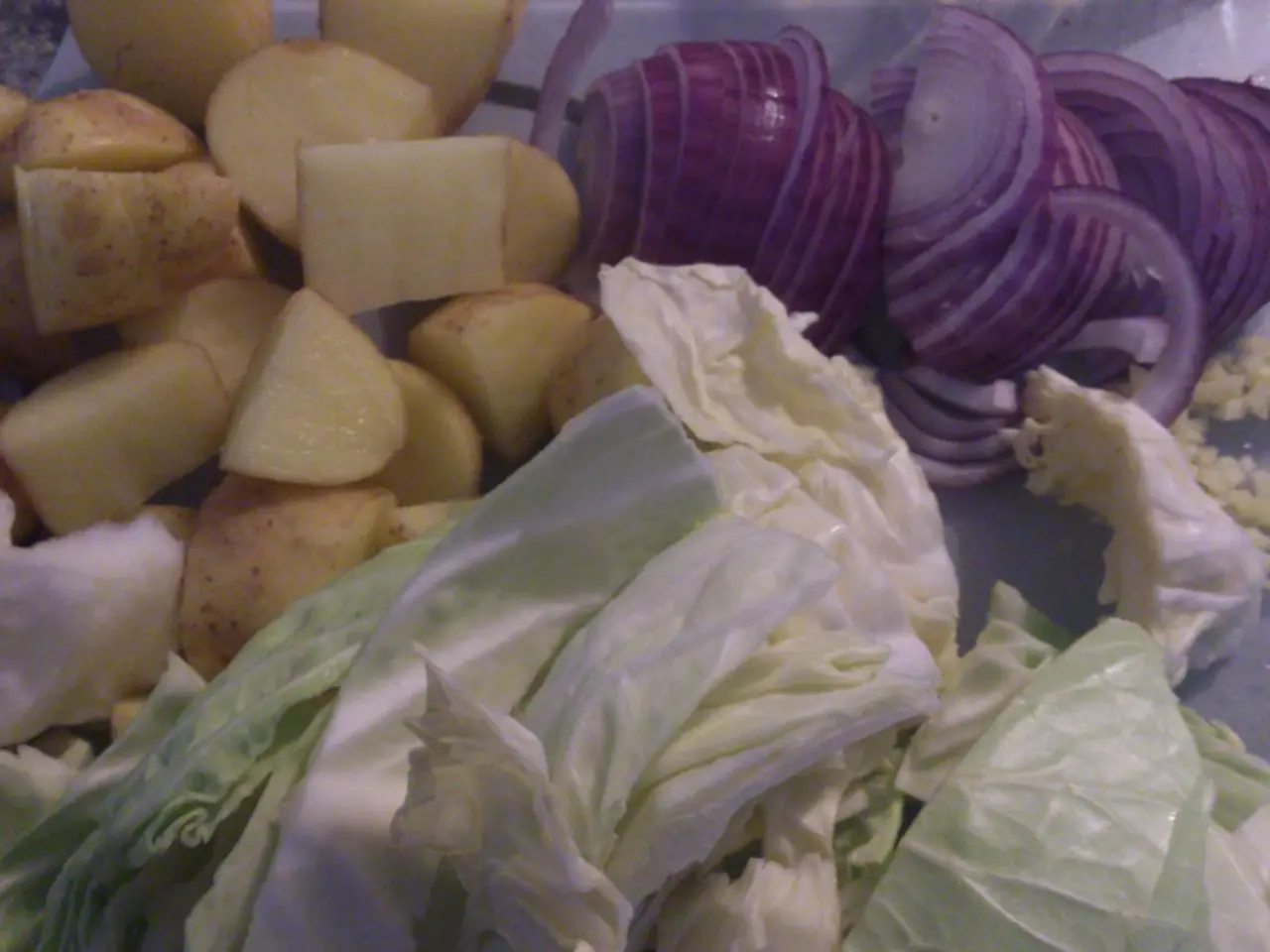Rich sources of potassium: Apricots, potatoes, and additional options
Potassium, an essential electrolyte, plays a crucial role in regulating fluid and blood levels in the body. Adequate intake of this mineral is vital for maintaining optimal health. The Office of Dietary Supplements and the National Institutes of Health recommend a variety of high-potassium foods, beyond the common knowledge of bananas and potatoes.
While bananas contain 422 milligrams (mg) of potassium per medium fruit, several other foods offer even higher amounts. For instance, one medium baked potato with skin contains 926 mg, and half a cup of dried apricots boasts an impressive 1,638 mg.
Leafy greens like spinach (839 mg per cup cooked) and Swiss chard (961 mg per cup cooked) are rich in potassium, as well as vitamins A, K, C, and antioxidants. Tomatoes and tomato products, such as tomato sauce, provide around 728 mg of potassium per cup. Avocados, known for their healthy fats, contain about 975 mg of potassium per fruit.
Beans and legumes, such as black beans (611 mg per cooked cup) and lentils, are good plant-based potassium sources. Squash varieties like acorn squash and pumpkin offer 410-564 mg per cooked cup, along with vitamins A and E. Yogurt, especially plain low-fat, contains about 573 mg of potassium per cup, plus protein and minerals such as calcium and magnesium.
Other vegetables such as kale, collard greens, broccoli, mustard greens, turnip greens, beet greens, and red/orange peppers are also recommended high-potassium options.
Fish, too, offers significant amounts of potassium. For example, wild Atlantic salmon contains up to 370 mg of potassium per 3-oz serving, while Pollock contains 388 mg per serving. Mackerel, rainbow trout, and tuna are also good sources, providing between 341-383 mg per serving.
Dairy products like milk and yogurt also contribute to your daily potassium intake. A cup of 1% milk contains 351 mg of potassium, while a cup of cooked Swiss chard contains 961 mg.
Canned stewed tomatoes, carrot juice, pomegranate juice, tangerine juice, and tomato juice are additional high-potassium beverage options. For instance, a cup of canned stewed tomatoes contains 518 mg of potassium, and a cup of tomato juice contains 527 mg.
A diet high in potassium and low in sodium can lower blood pressure and reduce the risk of heart disease and stroke. The recommended daily intake of potassium for adults is 3,400 mg for men and 2,600 mg for women. However, the daily value (DV) of potassium is 4,700 mg.
Incorporating these high-potassium foods into your diet can significantly boost your potassium intake and contribute to better health.
- Aq, a mineral essential for maintaining optimal health, plays a crucial role in regulating fluid and blood levels.
- The Office of Dietary Supplements recommends various high-potassium foods beyond commonly known sources like bananas.
- One medium baked potato with skin contains more potassium (926 mg) than a medium banana (422 mg).
- Cooked spinach is rich in potassium (839 mg per cup) as well as vitamins A, K, C, and antioxidants.
- Swiss chard, another leafy green, contains even more potassium (961 mg per cup cooked).
- Tomatoes and tomato products offer about 728 mg of potassium per cup.
- Avocados, known for their healthy fats, contain approximately 975 mg of potassium per fruit.
- Black beans are a good plant-based source of potassium (611 mg per cooked cup).
- Lentils also offer substantial amounts of potassium.
- Acorn squash and pumpkin offer potassium (410-564 mg per cooked cup).
- Yogurt, especially low-fat varieties, provides around 573 mg of potassium per cup.
- Kale, collard greens, broccoli, mustard greens, turnip greens, beet greens, and red/orange peppers are also high-potassium options.
- Wild Atlantic salmon offers 370 mg of potassium per serving.
- Pollock provides 388 mg of potassium per serving.
- Mackerel, rainbow trout, and tuna are good sources of potassium.
- Dairy products like milk and yogurt contribute to daily potassium intake.
- A cup of 1% milk contains 351 mg of potassium.
- Canned stewed tomatoes are another high-potassium beverage option (518 mg per cup).
- Tomato juice contains 527 mg of potassium per cup.
- A diet high in potassium and low in sodium can lower blood pressure.
- The recommended daily intake of potassium for adults is 3,400 mg for men and 2,600 mg for women.
- The daily value (DV) of potassium is 4,700 mg.
- Incorporating these high-potassium foods into your diet can boost potassium intake significantly.
- Better health can be contributed to by this increased intake of potassium.
- Obesity, type 2 diabetes, and chronic kidney disease are some medical conditions that can benefit from a diet rich in potassium.
- Chronic diseases like asthma and cardiovascular health also improve with a diet rich in potassium.
- Respiratory conditions and digestive health can also be positively affected.
- Eye health, hearing, and skin care can also benefit from a potassium-rich diet.
- Fitness and exercise, therapies and treatments, and nervous system functions can all be improved.
- Autoimmune disorders, neurological disorders, and climate change can be indirectly impacted by a balanced diet including high potassium foods.
- Renewable energy, manufacturing, retail, entrepreneurship, transportation, leadership, diversity and inclusion, automotive, small business, investing, finance, real estate, stock market, private equity, personal finance, banking and insurance, fintech, and the housing market can all be related to maintaining optimal health through a balanced diet, including high-potassium foods.




